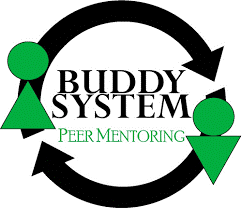
You can get a lot of advice from people like us, and from going to conferences, reading books and trolling the internet for all the pertinent information you need. And that is all good.
But there is another strategy for information- and experience-gathering that is not often used and really works. It’s the buddy system. The idea has its origins in the safety industry, and it has been used in many situations where it’s good to have someone else “watch your back” and/or teach you what they know.
The buddy system has a number of benefits
- It helps new MGOs learn about how the organization works.
- It speeds up the MGO’s acclimatization to the organization’s culture
- It actually increases productivity of a new MGO because she learns the do’s and don’ts more quickly, not to mention strategies and approaches to use in every situation.
- It builds relationships with the new MGO so he feels included and wanted. This helps MGO retention.
- It helps the MGO develop confidence more quickly. There is nothing worse than wandering around alone in a new organization.
- It increases collaboration as the new employee learns who to work with more quickly.
Susan Levin, the Director of Major Gift Programs for the Western Territory of the Salvation Army, oversees 35+ MGOs in the western United States. It’s a big job, but she makes training and onboarding easier by using her experienced MGOs to train the new MGOs. This doesn’t mean that other training does not happen. It does.
But the point here is that the MGOs who “know the ropes” pass their on knowledge to the new MGOs coming in. That immediately saves time, increases job satisfaction for the MGO and assures better MGO retention.
Now, you might be saying: “Richard, you and Jeff are constantly telling us that the MGO should not be engaged in anything other than managing their caseload. How come you are departing from that ‘rule’ with this suggestion?”
Well, first of all this does not take that much time. Secondly, it is the one non-caseload activity that actually contributes to the long-term health of the major gift program. If a manager can get a MGO up and running sooner, there is actually a net time savings vs. the loss associated with the MGO doing other activities like doing airport runs, unloading trucks, doing work at an event, etc.
I do think you need to watch that even this activity doesn’t start creeping over into more full-time work, where the MGO would actually be hurting the caseload she manages.
Bottom line, this is a useful and practical way to pass on important knowledge and experience to the new MGO who is joining your team. Try it.
Richard




Good Job, excellent article, i loved it the way that you explained,
I would like to learn more about how this is done. Is it possible to reach out to Susan Levin directly or can you share additional details? I would like to know if an agenda/schedule is used and, if so, what it includes, as well as how long the buddy system lasts before the new MGO begins working independently